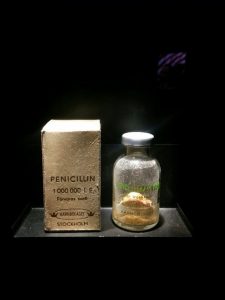 By Maria-Elizabeth Baeva, MSc student, Jefferies Lab
By Maria-Elizabeth Baeva, MSc student, Jefferies Lab
This is the third article in the Nobel Prize blog series.
Read the first article: Nobel Prize Series Introduction: Pomp and Circumstance?
Read the second article: Nobel Prize Series Part 1: The Man, the Mystery and the Million-Dollar Question: Why?

Figure 1: Alexander Fleming was awarded the Nobel prize in Physiology or Medicine in 1945 for his accidental discovery of the antibiotic Penicillin. An old sample of penicillin is on display at the Nobel Prize Museum in Stockholm, Sweden (Personal photo by Maria-Elizabeth Baeva).
Now that we have discussed the origins of the prize and its creator, we will focus on how the prize is awarded and some of the issues that have arisen throughout the years. First, let’s give a brief summary of the governance and structure of the Nobel Prize. There are five official prizes awarded by separate institutions: the Nobel Prizes for Physics and Chemistry are awarded by the Royal Swedish Academy of Sciences, the Nobel Prize for Physiology or Medicine is awarded by the Karolinska Institute, the Nobel Prize for Literature by the Swedish Academy and the Nobel Peace Prize by the Norwegian Nobel Committee. The odd one out is the Sveriges Riksbank Prize in Economic Sciences in Memory of Alfred Nobel that was established in 1969. This prize, not in Alfred’s will and therefore not officially a Nobel Prize, is concurrently presented at the Nobel Prize Award Ceremony.
While it is up to the institutions to determine the awardees, the Nobel Foundation is responsible for the legal, financial and administrative aspects of the prize and does not concern itself with the actual recipients. The nomination, deliberation and selection of the prize recipients is a closely guarded secret, but the general process is that the institutions responsible for their prize invite approximately 6,000 experts in their field to propose and nominate candidates. One thousand people submit nominations, of which there are 100-250 nominees. Only individuals are nominated, except for the Peace Prize, wherein institutions can be nominated.
Because of the great secrecy surrounding the Nobel Prize committees, it is difficult to interrogate the criteria and decision-making process governing nominations. And we see throughout history the failure in this process. One of the most notable examples is Mahatma Gandhi never having won the Nobel Peace Prize despite being arguably one of the most important civil rights activists in at least 200 years. But for the rest of this article, we will focus on the issues with the scientific prizes specifically.
In my view, there are three main issues that are at play with the strict guidelines of the Nobel Prize: no posthumous awards, the favoritism towards basic science rather than application, and, probably most egregious, the insistence on awarding only up to 3 individuals per prize. There is much more to be discussed regarding racial, political, socio-economic and gender bias, a topic which will be more thoroughly discussed in the next article. So, for now, we will focus on the three aforementioned problems.
Many are aware of the famous story of Rosalind Franklin, whose X-ray diffraction images of DNA were critical to elucidating the structure of the DNA double helix, but who did not share the prize. This is partly attributed to sexism, but also to her death in 1958 prior to the award being given to James Watson and Francis Crick in 1962. This latter explanation is actually incorrect, as the posthumous award rule was only established in 19741. Previously, the prize had been awarded twice posthumously2. There have been rare exceptions, such as in 2011 when the committee announced a winner for the Nobel Prize for Physiology or Medicine without knowing that the recipient had already died3. So clearly this rule is nonsense, right? I’ve always struggled to understand the logic behind this rule. The Nobel Prize Statutes do not provide a reasoning for this decision either1. I have been unable to find a single article defending this position. Does a discovery disappear with its inventor? Of course not. If the purpose of this prize is to celebrate humanity’s greatest achievements, it seems odd that as soon as the person passes, we are unable to acknowledge their contributions to the betterment of our society.
The next issue is the preference to award discovery over application. While we like to assume that discovery is a meritocratic process, I would argue that application often has more scientific basis and logic than discovery, which some can argue is based to some degree on luck4. The best example of this flawed unofficial policy is vaccinations. No one can argue that the Salk or Sabin polio vaccines weren’t incredible scientific achievements and huge benefits for society, and yet only one vaccine has ever been awarded the Nobel Prize: Max Thieler won the prize in 1951 for his “discovery” of an effective vaccine against yellow fever5.
And finally, perhaps the stipulation that is the most antithetical to the spirit of science: only three individuals can be nominated for one prize. During the time of Alfred Nobel, maybe it made sense to presume an individual was responsible for most of the work on a publication or discovery. However, we know that this is not the case anymore. Not only is the number of authors per publication increasing, but a fundamental principle of science is its iterative and collaborative nature6. Can the discovery of a new immune cell be correctly attributed to an individual without precedential advances in technology or all the students and technicians who ran the crucial experiments that led to this knowledge? Can we say an idea or hypothesis is truly unique if it should be based on previous evidence? I don’t have the solution, but these issues need more discussion and debate rather than acceptance of a longstanding dogma.
All of this brings me to my concluding thoughts: Why not change these obvious issues? Clearly, the committee is not bound to Alfred’s will. The posthumous statute is a prime example of a rule added decades later. And yet, it is 2020, we are suffering through a global pandemic and we hang on to customs and traditions that seem to arbitrarily restrict access and acclaim.
Is holding on to traditions meaningless? Certainly not. But this is more than just a silly annual tradition that brings us comfort and a sense of community. There are real consequences when these prizes are awarded.
But first, we need to talk about discrimination.
Read the next article in the series: Nobel Prize Series Part 3: The Choice Between Acknowledgment and Atonement.
Sources:
1 NobelPrize.org. Statutes of the Nobel Foundation. Nobel Media AB 2020. Accessed 26 September 2020. https://www.nobelprize.org/about/statutes-of-the-nobel-foundation/
2 NobelPrize.org. (2009, October 5th). Nobel Prize facts. Nobel Media AB 2020. Accessed 26 September 2020. https://www.nobelprize.org/prizes/facts/nobel-prize-facts
3 Sample, I. (2011, October 3rd). Nobel prize to be awarded to dead scientist. The Guardian. Accessed 26 September 2020. https://www.theguardian.com/science/2011/oct/03/nobel-prize-awarded-dead-scientist
4 Orzel C. (2017, April 10th). A Little Luck Is Essential For Success In Science. Forbes. Accessed 26 September 2020. https://www.forbes.com/sites/chadorzel/2017/04/10/a-little-luck-is-essential-for-success-in-science/#48ec53e75138
5 Norrby E. (2007). Yellow fever and Max Theiler: the only Nobel Prize for a virus vaccine. The Journal of Experimental Medicine, 204(12), 2779–2784. https://doi.org/10.1084/jem.20072290
6 Mallapaty, S. (2018, January 30th). Paper authorship goes hyper. Nature Index. Accessed 26 September 2020. https://www.natureindex.com/news-blog/paper-authorship-goes-hyper
The Editors of Encyclopaedia Britannica. (2020, July 6th) Nobel Prize. Encyclopædia Britannica. https://www.britannica.com/topic/Nobel-Prize
Lichtman M. A. (2017). Alfred Nobel and His Prizes: From Dynamite to DNA. Rambam Maimonides Medical Journal, 8(3), e0035. https://doi.org/10.5041/RMMJ.10311


